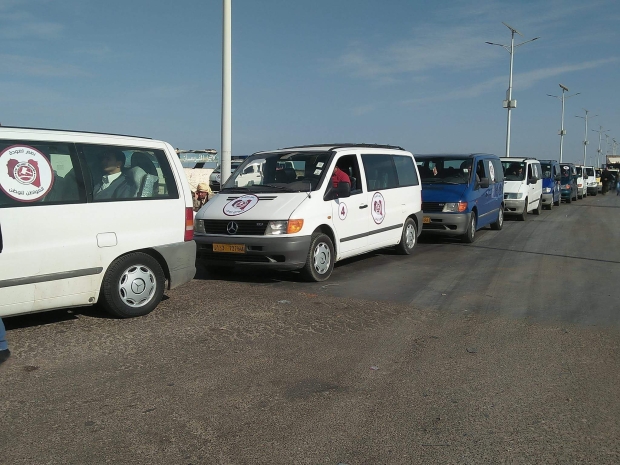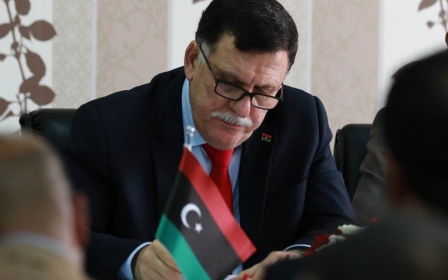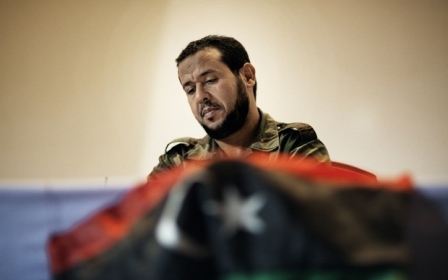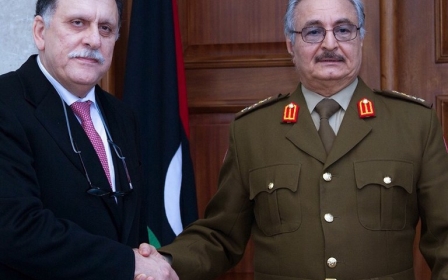Libyans stranded in Egypt are helped back home in new initiative

Last month, a convoy of 19 Libyan families left the Egyptian capital Cairo for the city of Tobruk in eastern Libya.
It is a journey that many thousands have made in the opposite direction since the NATO-backed uprising in 2011 that led to the fall of Muammar Gaddafi.
But now some are making the return journey thanks to a scheme supported by Libyan businessman and philanthropist Hassan Tatanaki.
On arrival, the families - 95 people all in all - were allocated two blocks of fully furnished apartments and provided with a monthly stipend of 1,000 Libyan Dinars ($714) for the year.
This was made possible by Justice First - an NGO set up to help Libyans displaced in Egypt return to their home country.
“All Libyans have the right to return to their homes, live in their country like everyone else,” said Tatanaki, who chairs and funds the organisation.
He claimed that no other organisation or government institution has taken concrete action to make the repatriation of Libyans possible.
“A couple of months ago, I started calculating how much it would cost me to repatriate, accommodate and sustain a family for one year,” the philanthropist said. “I budgeted roughly LD 40,000 ($28,570) each.”
Tatanaki said roughly 20 percent of Libya’s population were stranded outside Libya, many of whom lacked the financial or logistical capability to go back home.
The case of Jibril el-Sherif
Sitting on a wheelchair, Jibril el-Sharif, who’s originally from Sirte, talked of the ordeal he has been through with his family since the 2011 revolution.
In May 2011, he was injured by NATO carpet-bombing that destroyed Sirte's infrastructure and struck civilian homes, including his own.
Forced to flee like many other families, Jibril together with his wife and mother were first displaced to Bani Walid, in western Libya, in September 2011 then to Tripoli where they lived between 2012 and 2013.
Libya’s civil war was by then spiralling out of control. Clashes between rival militias raged around the capital, and killings and kidnappings were on the rise.
In March 2014, the family left for Egypt. It has been two hard years since.
“I couldn’t find work in Egypt, or obtain residency, and I don’t get any help from the state,” Jibril said. “Every start of the month, when I’m due to pay the rent, is a nightmare. Everyday it’s a struggle.”
An army employee back in Libya, his salary has been frozen for a year.
“When I was receiving my pay, worth $100, it was already nothing to live on here,” he said. “Right now, we’re running out of money. The last six months have been very hard.”
Nour al-Gaddafi, Jibril’s wife, echoed her husband’s words.
“I couldn’t find a job either, we have to pay for everything, we’re not living a decent life here,” she said despondently.
“In Libya we had our own house, we could get free medical treatment and basic foodstuffs at a subsidised price,” she said.
Nour, who used to work as a nurse, saw her $100 salary blocked two years ago.
“I’ve had to sell my jewellery piece by piece, living on a small amount, and borrow money from family and friends back home,” she said.
Initially sceptical about Justice First’s project, the couple verified the information with the embassy, and scrolled through the pictures of the first convoy’s arrival on Facebook, and made up their minds to go back home.
After what they have been through, they feel safe about going to Tobruk – or any government-controlled town – far from the conflict. Jibril and Nour just want security.
Justice First
Justice First was established in 2012 with the aim of documenting humanitarian crimes committed in Libya, and promoting peace and justice.
Since then, it has widened its scope to the plight of Libyans who have been displaced since the 2011 revolution.
Discussing the project, Tatanaki said that the Libyan interim government’s minister of work and social affairs approached him to offer him assistance when news of his organisation spread.
The ministry now handles government-related matters for the returning citizens, such as unfreezing and paying backdated salaries to public sector employees, processing legal papers, and enrolling children in schools.
Entirely privately funded, the initiative will run for one year and is concentrated on Tobruk, near the Egyptian-Libyan border. In the future, it aims to identify towns in western Libya to repatriate citizens exiled to neighbouring Tunisia.
The families were met at the border by local tribal elders, and then accompanied by security officials to Tobruk.
Upon their arrival, the group was cheered and greeted by locals. A welcome reception was held with the participation of the mayor of Tobruk, officials from local government, and tribal elders.
“Our intent is to set a precedent for the government or any other NGO to do something tangible for the Libyan people,” said Tatanaki, adding that the idea is to avoid Libyans becoming a burden, like most refugees, in hosting countries.
Feedback from returnees has been positive, which has encouraged more Libyan exiles in Egypt to sign up for the scheme.
Better future?
Many of the Libyans living in Egypt suffer financial hardship as they are unemployed and do not have access aid to cover their daily expenses.
Ibrahim, a university professor from Tripoli, fled Libya for Egypt as the revolt began in 2011.
“I haven’t got any work opportunities here, no income. Egypt doesn’t grant Libyans work permits although Egyptians are allowed to work in Libya,” he complained.
Alongside his wife, sister and eight children, the professor has been living in debt. He will need five years to pay it off once he returns to Libya.
He underlined that no one has helped him in Egypt, not even the Libyan embassy who he said were particularly unhelpful.
Despite some uncertainty vis-à-vis the repatriation programme, Ibrahim talked to one of the returning families helped by Justice First last month and found that it was not the usual "all words no action".
“Once I’m in Tobruk and see for myself, I’ll spread the word. I have many relatives in the diaspora who want to go back,” he said.
Reflecting on Libya’s future, Ibrahim said: “If foreign countries, including some Arab states, stay away from Libya, we can rebuild our country and head towards a better future.”
“As long as the army takes over and clears Libya from armed militias, we can live in security and rule of law. Then I’m positive,” Jibril said.
A second set of families, 40 families overall, will depart from Egypt to Libya, within the next two weeks.
Middle East Eye propose une couverture et une analyse indépendantes et incomparables du Moyen-Orient, de l’Afrique du Nord et d’autres régions du monde. Pour en savoir plus sur la reprise de ce contenu et les frais qui s’appliquent, veuillez remplir ce formulaire [en anglais]. Pour en savoir plus sur MEE, cliquez ici [en anglais].





